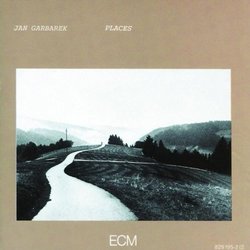| All Artists: Jan Garbarek Title: Places Members Wishing: 2 Total Copies: 0 Label: ECM Records Release Date: 7/30/2002 Genres: Jazz, Pop Styles: Modern Postbebop, Bebop Number of Discs: 1 SwapaCD Credits: 1 UPCs: 042282919526, 0042282919526 |
Search - Jan Garbarek :: Places
 | Jan Garbarek Places Genres: Jazz, Pop
|
Larger Image |
CD Details |
CD ReviewsBest of Jan! Matthew Barone | South Windsor, CT | 10/12/2005 (4 out of 5 stars) "I have this on LP and then updated it on to CD and I think this is one of the best. The best part is John Taylor on organ. He steals the show. If your looking for classic ECM then go here. This album is well worth the listen. I have a few of Jan's albums but this the one I play alot. Im sure if your in the mood for Europian Jazz then try it out." Good Ideas, Brooding, Existential, Very Sweet Gustave O. Frey | Oracle, AZ | 04/05/2007 (4 out of 5 stars) "This release starts with the brooding, maudlin tenor sax of "Dis" but then heads into the light of jazz fusion, rather than hiding in the shadows. The addition of organ, piano and drums here allows for expansive, energetic rhythmic development. This is the purest expression of Jan's fusion music I've heard because he is fresh from the "Belonging" release with Keith Jarrett but there is something more unbridled here because he is playing his own music, which is a little more open to the elements than Keith's. The piano takes a back, though very effective, seat here in the form of the organ. As is the case with Ralph Towner, Connors adds the classical Spanish acoustic guitar element to the mix and this plays differently with Jan's sax playing than Jarrett's piano. I like it better in some ways as it skips along or broods more fluidly as the case may be.
On the first track, "Reflections," Garbarek's moody tenor is soon overtaken by DeJohnette's highly energized drumming, which evokes the frenetic pace of Israeli music. It is similar to the irregular time signature used on the opening track of "Birds of Fire" by Mahavishnu Orchestra. Garbarek and Connors stoke the fire but also provide the lubrication that prevents overheating and meltdown. The song is a masterpiece, as it squeezes all of the juice out of the concept and then leaves you very ready for the more reflective, religious mood of the next song. "Entering" starts with a gentle tenor melody that sounds a lot like Wayne Shorter's tenor work with Weather Report. The organ is right out of a Protestant service and you're left waiting for the reverend to speak. Garbarek gives a little sermon a la Shorter and you are led further into the bowels of the sanctuary. At just the right juncture, they shift to a circular, five-note mantra that is most effective. "Amen, and amen" could be added if you were singing. The simple passion of being spiritually connected with one another is more than most people can handle and the two brief solos by Connors and Garbarek get a little shaky at points. The only thing missing are a few flourishes by the organist during Connors' solo - this is a hymn remember and a few flashes up and down the ivory are notoriously good for your spiritual health. The song ends with the original melody restated very elegantly. This song is another masterpiece in my opinon. "Going Places" is the only soprano piece and it starts off with a very nice up tempo melody. Then, Garbarek has to go fiddling with the eclectic and the song wonders off into a convoluted, abstract expressionist dark alley. You can follow it in with a flashlight if you want to, or go check your laundry. Then, the up tempo stuff comes roaring back for a few minutes and it's quite good. Garbarek's transition back into the fusion is very nice. DeJohnette's drumming is highly evolved and responsive throughout. "Passing" is another masterpiece. (I should have given this release a 5 and "Dis" a 4.) The melody is hard to remember, but the feeling is easy to recall: a restrained passion that is somehow perfectly balanced and elaborated. As with "Solstice" on Keith Jarrett's "Belonging," Garbarek's tenor here exploits the heightened drama created by indulging pathos: the greatest passions are arguably the saddest ones. Here, it's like Beethoven got hold of a samba and took it apart, slowed it down and added the extra brooding required by his northern sensibility. It is in this context that Garbarek is most creative, as he, like Jarrett, has a knack for melding standard jazz and romantic classical elements. He uses the tenor much like Gato Barbieri, but the Latin passions are rebundled and turned in on themselves in ways that make them even more beautiful. Barbieri tends to be a little melodramatic in his slower songs because he sticks closely to the Latin machismo format, where bravado is a necessary element. Garbarek presents the issue in a way that allows more feminine qualities to enter, so that he can be more asymmetrical and stark in his approach. If you slow some Latin music down enough, you'll see the connections, though, as the subject is basically the same, just presented differently. (Play Gato's "Viva Emilio Zapata" on a belt driven turntable, slow it down and you'll see in just how many ways Barbieri and Garbarek are related musically.) If you're new to Jan Garbarek and want to explore one of John Coltrane's more romanticized progenies (the other notable one being Gato Barbieri), this release is one of the good places to start. I wish we had more Garbarek releases from this era to enjoy and less of the far inferior New Age stuff he seems to have fallen in love with later." |

 Track Listings (4) - Disc #1
Track Listings (4) - Disc #1